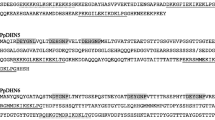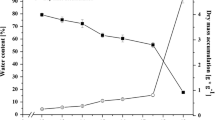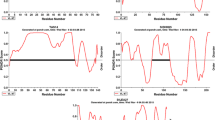Abstract
Dehydrins are a family of proteins characterised by conserved amino acid motifs, and induced in plants by dehydration or treatment with ABA. An antiserum was raised against a synthetic oligopeptide based on the most highly conserved dehydrin amino acid motif, the lysine-rich block (core sequence KIKEK-LPG). This antiserum detected a novel M r 40 000 polypeptide and enabled isolation of a corresponding cDNA clone, pPsB61 (B61). The deduced amino acid sequence contained two lysine-rich blocks, however the remainder of the sequence differed markedly from other pea dehydrins. Surprisingly, the sequence contained a stretch of serine residues, a characteristic common to dehydrins from many plant species but which is missing in pea dehydrin.
The expression patterns of B61 mRNA and polypeptide were distinctively different from those of the pea dehydrins during seed development, germination and in young seedlings exposed to dehydration stress or treated with ABA. In particular, dehydration stress led to slightly reduced levels of B61 RNA, and ABA application to young seedlings had no marked effect on its abundance.
The M r 40 000 polypeptide is thus related to pea dehydrin by the presence of the most highly conserved amino acid sequence motifs, but lacks the characteristic expression pattern of dehydrin. By analogy with heat shock cognate proteins we refer to this protein as a dehydrin cognate.
Similar content being viewed by others
References
Bensaude, O, Mezger, V, Morange, M: Developmental regulation of heat-shock protein synthesis in unstressed and stressed cells. In: Jeanteur, P, Kuchiro, Y, Muller WEG, Paine, PL (eds) Progress in Molecular and Subcellular Biology, pp. 89–111. Springer-Verlag, Berlin (1991).
Bray, EA: Molecular responses to water deficit. Plant Physiol 103: 1035–1040 (1993).
Chandler, PM, Robertson, M: Gene expression regulated by abscisic acid and its relation to stress tolerance. Ann Rev Plant Physiol Plant Mol Biol 45: 113–141 (1994).
Chen, R-D, Campeau, N, Greer, AF, Bellemare, G, Tabaeizadeh, Z: Sequence of a novel abscisic acid-and drought-induced cDNA from wild tomato (Lycopersicon chilense). Plant Physiol 103: 301 (1993).
Chou, PC, Fasman, GD: Prediction of the secondary structure of proteins from their amino acid sequence. Adv Enz 47: 45–148 (1978).
Close, TJ, Kort, AA, Chandler, PM: A cDNA-based comparison of dehydration-induced proteins (dehydrins) in barley and corn. Plant Mol Biol 13: 95–108 (1989).
Close, TJ, Fenton, RD, Moonan, F: A view of plant dehydrins using antibodies specific to the carboxy terminal peptide. Plant Mol Biol 23: 279–286 (1993).
Cohen, A, Plant, AL, Moses, MS, Bray, EA: Organ-specific and environmentally regulated expression of two abscisic acid-induced genes in tomato. Plant Physiol 97: 1367–1374 (1991).
DureIII, L, Crouch, M., Harada, J, Ho, T-H, Mundy, J, Quatrano, R, Thomas, T, Sung, ZR: Common amino acid sequence domains among the LEA proteins of higher plants. Plant Mol Biol 12: 475–486 (1989).
Galau, GA, Hughes, DW, DureIII, L: Abscisic acid induction of cloned cotton late embryogenesis-abundant (lea) mRNAs. Plant Mol Biol 7: 155–170 (1986).
Gething, M-J, Sambrook, J: Protein folding in the cell. Nature 355: 33–45 (1992).
Gilmour, SJ, Artus, NN, Thomashow, MF: cDNA sequence anlysis and expression of two cold-regulated genes of Arabidopsis thaliana. Plant Mol Biol 18: 13–21 (1992).
Godoy, JA, Pardo, JM, Pintor-Toro, JA: A tomato cDNA inducible by salt stress and abscisic acid: nucleotide sequence and expression pattern. Plant Mol Biol 15: 695–705 (1990).
Goldberg, RB, Barker, SJ, Perez-Garaul, L: Regulation of gene expression during plant embryogenesis. Cell 56: 149–160 (1989).
Hajela, RK, Horvath, DP, Gilmour, SJ, Thomashow, MF: Molecular cloning and expression of cor (cold-regulated) genes in Arabidopsis thaliana. Plant Physiol 93: 1246–1252 (1990).
Hendrick, JP, Hartl, F-U: Molecular chaperone functions of heat-shock proteins. Ann Rev Biochem 62: 349–384 (1994).
Houde, M, Danyluk, J, Laliberte, J-F, Rassart, E, Dhindsa RS, Sarhan, F: Cloning, characterization, and expression of a cDNA encoding a 50-kilodalton protein specifically induced by cold acclimation in wheat. Plant Physiol 99: 1381–1387 (1992).
Hughes, DW, Galau, GA: Developmental and environmental induction of Lea and LeaA mRNAs and the post-abscission program during embryo culture. Plant Cell 3: 605–618 (1991).
Ingolia, TD, Craig, EA: Drosophila gene related to the major heat shock-induced gene is transcribed at normal temperatures and not induced by heat shock. Proc Natl Acad Sci USA 79: 525–529 (1982).
Joshi, CP, King, SW, Nguyen, HT: Molecular cloning and characterization of a cDNA encoding a water stress protein (WSP23) from wheat roots. Plant Sci 86: 71–82 (1992).
Lång, V, Palva, ET: The expression of a rab-related gene, rab 18, is induced by abscisic acid during the cold acclimation process of Arabidopsis thaliana (L.) Heynh. Plant Mol Biol 20: 921–962 (1992).
Lindquist, S, Craig, EA: The heat shock proteins. Annu Rev Genet 22: 631–677 (1988).
Mundy, J, Chua, N-H: Abscisic acid and water-stress induce the expression of a novel rice gene. EMBO J 7: 2279–2286 (1988).
Needleman, SB, Wunsch, CD: A general method applicable to the search for similarities in the amino acid sequence of two proteins. J Mol Biol 48: 443–453 (1970).
Okubara, PA, Williams, SA, Doxsee, RA, Tobin, EM: Analysis of genes negatively regulated by phytochrome action in Lemna gibba and identification of a promoter region required for phytochrome responsiveness. Plant Physiol 101: 915–924 (1993).
Panyim, S, Chalkley, R: The molecular weights of vertebrate histones exploiting a modified sodium dodecyl sulfate electrophoresis method. J Biol Chem 246: 7557–7560 (1971).
Pelham, HRB: Speculations on the functions of the major heat shock and glucose-regulated proteins. Cell 46: 959–961 (1986).
Piatkowski, D, Schneider, K, Salamini, F, Bartels, D: Characterization of five abscisic acid-responsive cDNA clones isolated from the desccation tolerant plant Craterostigma plantagineum and their relationship to other water-stress genes. Plant Physiol 94: 1682–1688 (1990).
Pla, M, Gomez, J, Goday, A, Pages, M: Regulation of the abscisic acid-responsive gene rab28 in maize viviparous mutants. Mol Gen Genet 230: 394–400 (1991).
Proudfoot, N: Poly(A) signals. Cell 64: 671–674 (1991).
Robertson, M, Chandler, PM: Pea dehydrins: identification, characterisation and expression. Plant Mol Biol 19: 1031–1044 (1992).
Skriver, K, Mundy, J: Gene expression in response to abscisic acid and osmotic stress. Plant Cell 2: 503–512 (1990).
Tissieres, A, Mitchel, HK, Tracy, UM: Protein synthesis in salivary glands of Drosophila melanogaster: relation to chromosome puffs. J Mol Biol 84: 389–398 (1974).
Wolfraim, LA, Langis, R, Tyson, H, Dhindsa, RS: cDNA sequence, expression, and transcript stability of a cold acclimation-specific gene, cas18, of alfalfa (Medicago falcata) cells. Plant Physiol 101: 1275–1282 (1993).
Young, RA, Davis, RW: Efficient isolation of gene by using antibody probes. Proc Natl Acad Sci USA 80: 1194–1198 (1983).
Author information
Authors and Affiliations
Rights and permissions
About this article
Cite this article
Robertson, M., Chandler, P.M. A dehydrin cognate protein from pea (Pisum sativum L.) with an atypical pattern of expression. Plant Mol Biol 26, 805–816 (1994). https://doi.org/10.1007/BF00028850
Received:
Accepted:
Issue Date:
DOI: https://doi.org/10.1007/BF00028850




